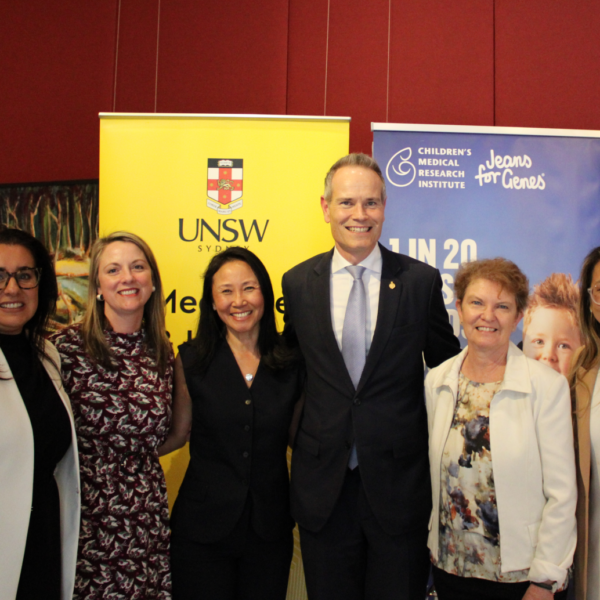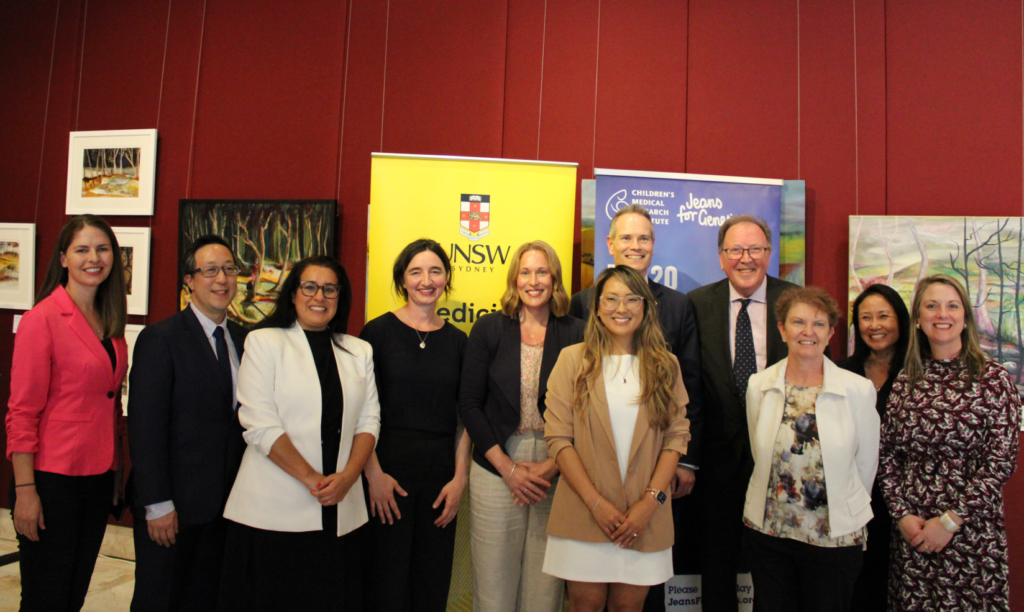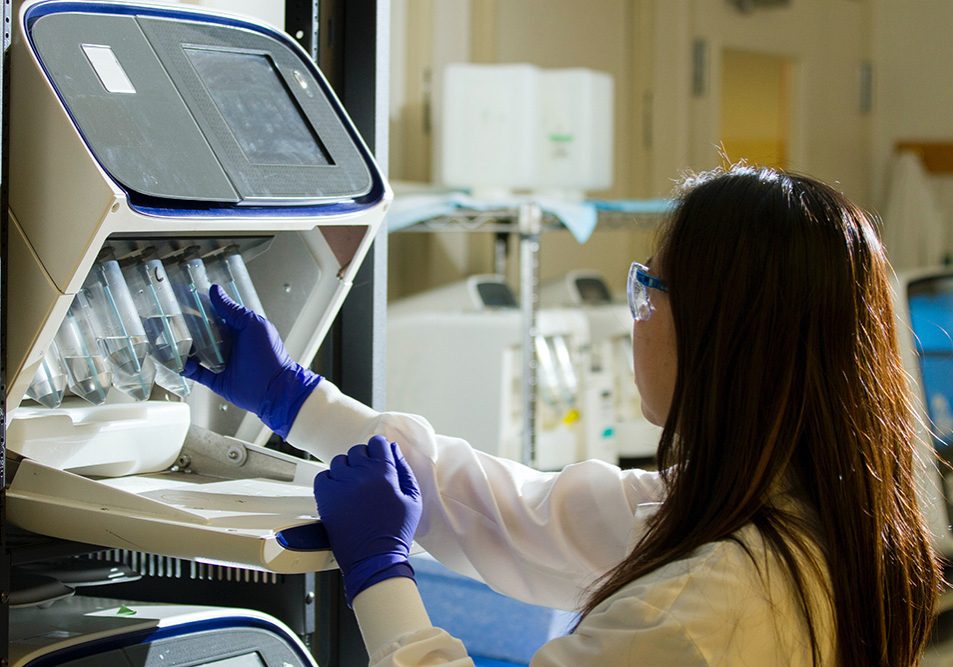26 September, 2024
We are thrilled to share the Top 10 Research Priorities for Inherited Retinal Disease, determined from an 18-month study from the perspective of individuals with lived experience, guardians, carers and families and health professionals together for the first time in Australia.
These priorities focus on four key areas: Treatments and cures, Psychosocial wellbeing, Health service delivery, and Symptoms and disease progression. Notably, two of the top three priorities are related to treatments, with another focusing on detection, aligning with Retina Australia’s commitment to research funding.
The Top 10 Research Priorities were announced on Tuesday 24th September 2024 at the launch of the Inherited Retinal Disease Priority Setting Partnership report at NSW Parliament House in Sydney, supported by Vision 2020 Australia and MPs Tim James and Dr Michael Holland.
Pictured top right at the launch event – from left: Associate Professor Anai Gonzalez-Cordero – Children’s Medical Research Institute (CMRI), Carly Iles – Vision 2020 Australia, Julia Hall – Retina Australia, Tim James MP, Professor Robyn Jamieson – CMRI; The Children’s Hospital; University of Sydney, Dr Eden Robertson – UNSW Medicine & Health; CMRI

The Inherited Retinal Disease Priority Setting Partnership
The Inherited Retinal Disease Priority Setting Partnership, previously known as the Vision Loss Priority Setting Partnership, was led by Dr Eden Robertson, UNSW Medicine and Health; Children’s Medical Research Institute, and guided by an expert Steering Committee that involved individuals with lived experience, researchers, health professionals and community organisation representatives.
Steering Committee
Retina Australia was represented on the Steering Committee by its Chair, Leighton Boyd AM and CEO, Julia Hall, along with other members including Associate Professor Anai Gonzalez-Cordero, Dr Kate Hetherington, Professor Robyn Jamieson, Sally Karandrews, Dr Meredith Prain, Dr Alan Ma, Associate Professor Lauren Ayton, Professor Matthew Simunovic, Emily Shepard, Hollie Feller and Kanae Yamamoto.
Project funding
The project was funded through a Medical Research Futures Fund (MRFF) Stem Cell Therapies Mission Grant, led by Associate Professor Anai Gonzalez-Cordero, Children’s Medical Research Institute (CMRI) and Dr Kate Hetherington, UNSW Medicine and Health, alongside several other investigators.
What are the Top 10 Research Priorities for Inherited Retinal Disease?
The top 10 Research Priorities for Inherited Retinal Disease are:
- What treatments can safely prevent, slow down or stop vision loss that occurs for someone with an IRD?
- What is the psychological impact of having an IRD, and what support is most effective?
- What treatments can safely restore vision for someone living with an IRD?
- What are the information and psychosocial needs of individuals with an IRD and their families at diagnosis?
- What training and/or guidelines are needed for health professionals to provide optimal support for individuals with an IRD, from diagnosis and beyond?
- What are the most effective ways to support carers and family members of an individual with an IRD?
- How do environmental and lifestyle factors influence IRD symptoms and disease progression?
- What are the most effective ways to manage IRD symptoms?
- How can a program to detect IRDs as early in life as possible be implemented?
- What is the anticipated progression of vision loss for each IRD?
Affirms alignment with Retina Australia’s Research Grants Program
With two of the top three priorities relating to treatments, and another focusing on detection, these priorities affirm that Retina Australia’s research focus aligns with the views of people affected by inherited retinal disease. Retina Australia’s Research Grants Program is focused on funding projects that promote early detection, discover preventions, and advance treatments, with the ultimate goal to progress towards unlocking cures into inherited retinal diseases.
Why are these priorities so important?
These priorities have been established by individuals with lived experience, guardians, carers and families and health professionals. It is important that research about Inherited Retinal Diseases is guided by what matters most to those who will be impacted by it.
We thank all those who participated in the project through completion of either or both of the surveys and/or participation in the final workshops. Special thanks to the Retina Australia members who took the time to contribute their valued thoughts to determining the Top 10 Research Priorities for Inherited Retinal Disease.
“The rigour and inclusiveness of this priority setting process means that it will remain relevant for many years to come. I am very proud to be a part of this work and pleased that there are now clear directions for research that matters most to Australians impacted by an inherited retinal disease. For me, this becomes a legacy – my contributions in this work will go on to impact generations to come.”
Leighton Boyd AM, IRD Priority Setting Partnership Steering Committee member
Thank you to the research participants
Retina Australia would like to warmly thank all those in our community who kindly participated in this study, by either completing either or both of the surveys and/or participating in the workshops. Research cannot successfully progress without your involvement and your contributions were greatly valued, thank you so much.
Support organisations
Organisations who supported this project include: Vision 2020 Australia, The Royal Australian and New Zealand College of Ophthalmologists, Able Australia, Blind Citizens Australia, Human Genetics Society of Australasia, Australasian Society of Genetic Counsellors, Deafblind Australia, Centre for Eye Research Australia, Children’s Medical Research Institute, Child UnLimited, Guide Dogs NSW/ACT, Optometry NSW/ACT, Orthoptics Australia, PVI Alliance Australia, Retina Australia, Save Sight Institute, South Pacific Educators in Vision Impairment Inc., UNSW Medicine & Health, and UsherKids Australia.

Pictured above at the launch event – from left to right: Professor Claire Wakefield, Dr Alan Ma, Associate Professor Anai Gonzalez-Cordero, Dr Kate Hetherington, Emily Shepard, Dr Eden Robertson, Tim James MP, Dr Michael Holland MP, Professor Robyn Jamieson, Julia Hall, Carly Iles.
https://retinaaustralia.com.au/top-10-research-priorities-for-inherited-retinal-disease/
Other Blogs

Autosomal Dominant Optic Atrophy Webinar
Supporting people affected by mitochondrial disease Many types of mitochondrial disease (mito) can lead to progressive vision loss and blindness....

World Research Summary by Dr Catherine Civil
Hot Off The Press A very Happy New Year to you all, and may 2026 bring us another step closer to...

World Geographic Atrophy Day 2025
A New Era of Hope for Vision Preservation Geographic Atrophy (GA), a progressive and irreversible form of advanced age-related macular degeneration (AMD), has long been a...
